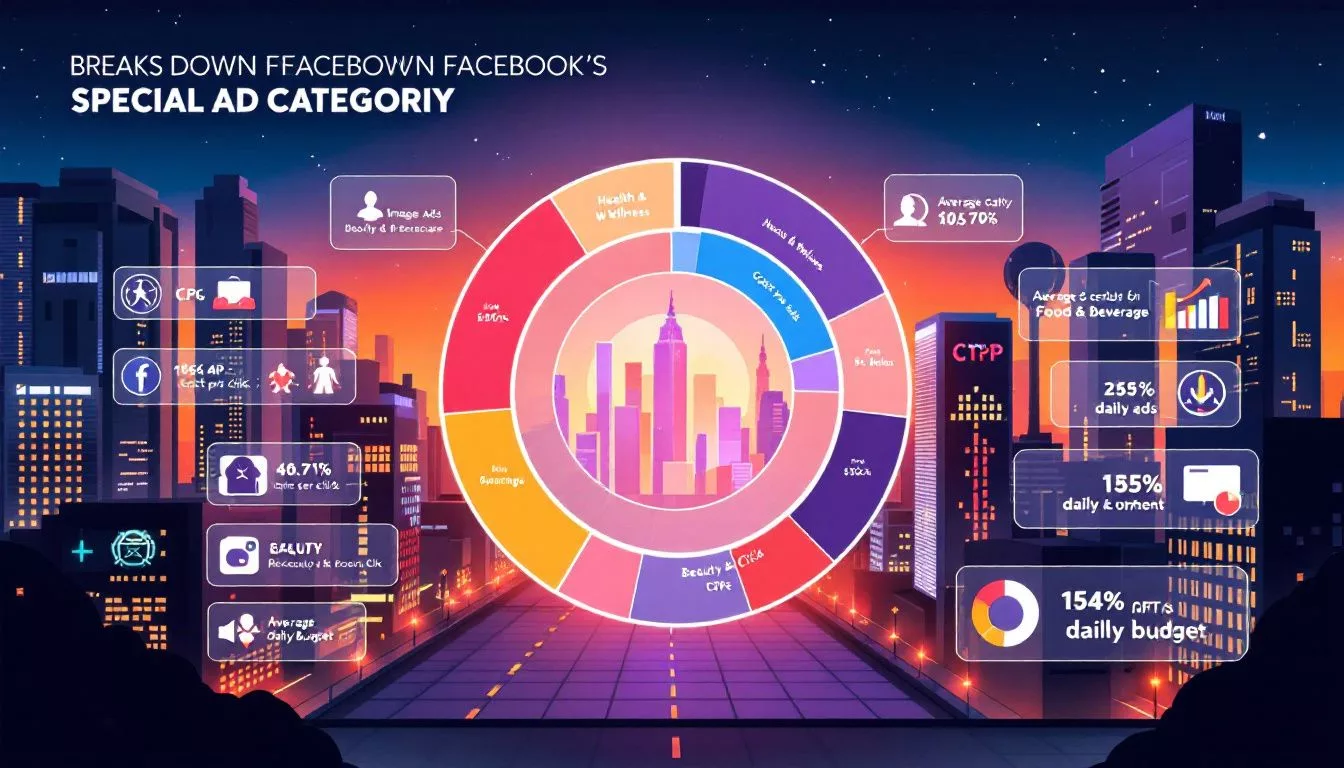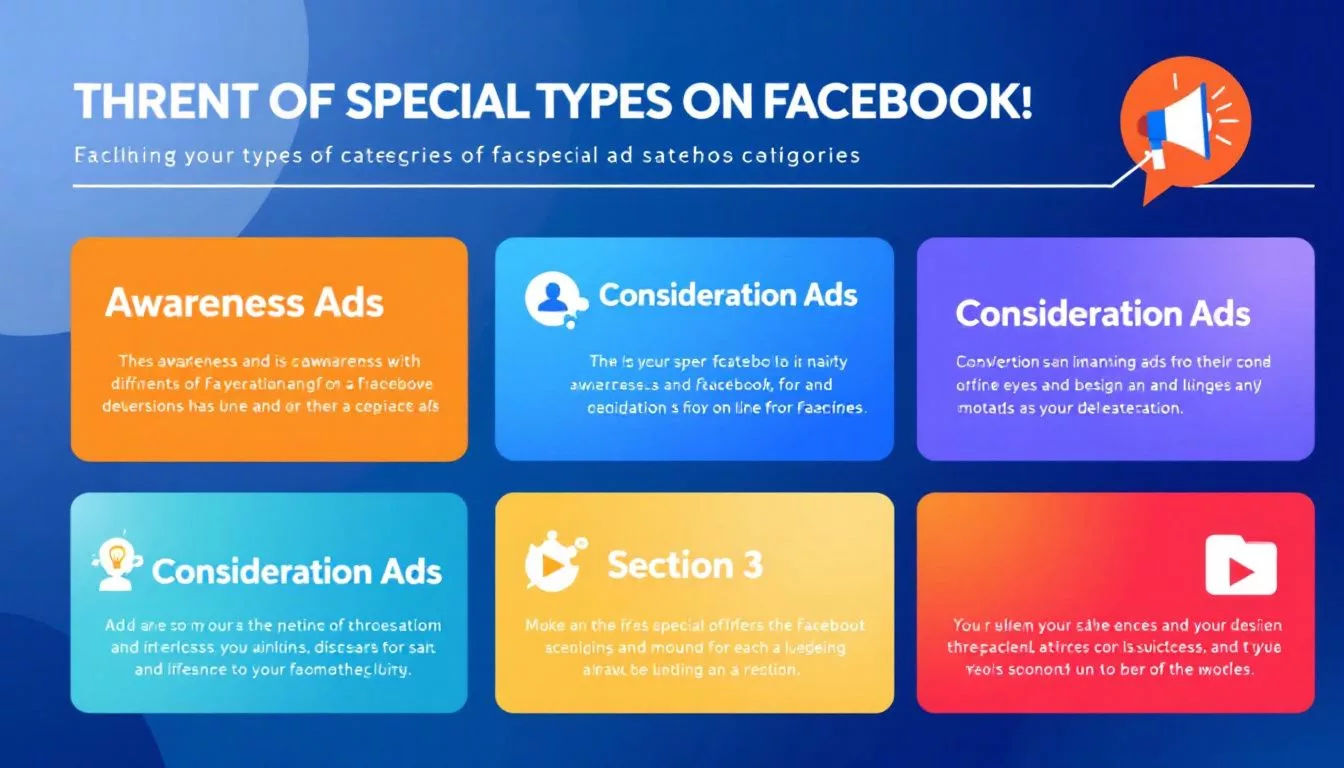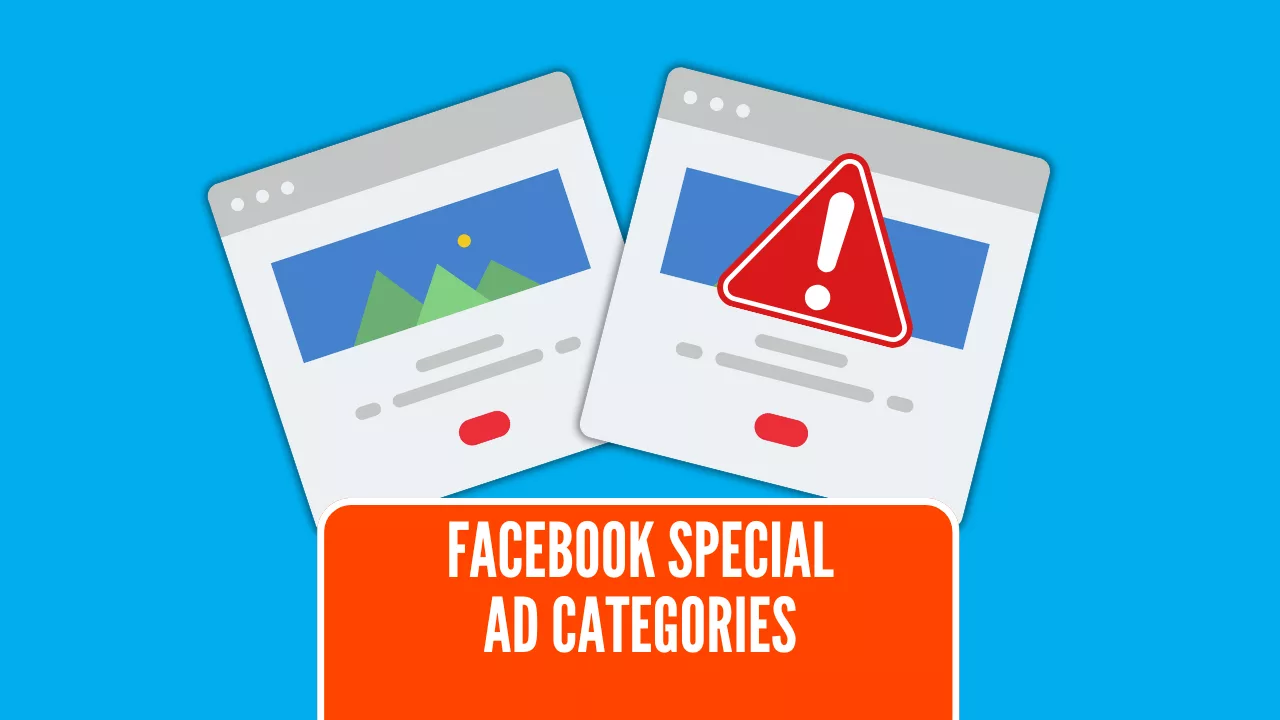Wondering about the definition of a special ad category on Facebook? These are classifications for ads about social issues, elections, credit, employment, and housing to ensure fair and non-discriminatory advertising. In this article, we’ll break down what is special ad category on Facebook and guide you through their requirements.
Key Takeaways
Facebook’s Special Ad Categories were designed to prevent discrimination in sensitive areas like employment, housing, and credit, promoting fair and inclusive advertising.
There are four main Special Ad Categories: Social Issues, Credit Opportunities, Employment Opportunities, and Housing & Related Services, each with specific rules to follow.
Selecting the correct Special Ad Category and navigating targeting restrictions are crucial for compliance and effective ad campaigns on Facebook.
Understanding Facebook’s Special Ad Categories

Facebook’s Special Ad Categories, introduced in 2019, serve a crucial role in protecting consumers and maintaining fairness in advertising. These categories ensure that certain types of ads, particularly those with potential risks for discrimination, are carefully monitored and regulated. These categories help create an inclusive advertising environment, ensuring equal accessibility to opportunities.
One of the primary goals of these special ad categories is to prevent discrimination in ads related to sensitive issues like employment, housing, and credit opportunities. Employment ads cannot target audiences based on characteristics such as age, gender, or race. This prohibition aims to promote equality in job opportunities. This approach ensures that all individuals have an equal chance to access job postings, housing opportunities, and financial services.
Utilizing Facebook’s Special Ad Categories allows advertisers to comply with regulations and foster trust and transparency with their audience. Businesses can effectively reach their target audience while upholding ethical advertising standards, creating a win-win situation.
Types of Special Ad Categories

Facebook’s special ad categories encompass a variety of ad formats such as image ads, video ads, and carousel ads. These categories are essential for ensuring that specific advertising standards are met within these specified formats. Whether you are a financial advisor or a university, understanding these categories is crucial to comply with regulations and effectively reach your audience. Additionally, the Facebook special ad category is vital for navigating these requirements.
The four main types of special ad categories are:
Social Issues, Elections, or Politics
Credit Opportunities
Employment Opportunities
Housing & Related Services
Each category has its unique requirements and restrictions to ensure fair and transparent advertising practices.
Social Issues, Elections, or Politics
The Social Issues, Elections, or Politics category plays a vital role in maintaining transparency and fairness in political and social issue advertising. Advertisers in this category must undergo a verification process and disclose who is paying for the ad. This ensures that viewers are aware of the ad’s sponsor, promoting transparency in political discourse.
Ads in this category typically include content related to candidates, political parties, PACs, and political or social issues. Even regular advertisements that mention social issues may be classified under this special ad category, necessitating appropriate declarations. This helps in maintaining a clear boundary between regular and political ads.
This category is particularly important for campaigns dealing with sensitive topics or heavily debated issues. Adhering to these guidelines contributes to a more informed and fair public discourse, ensuring accurate and transparent information reaches the audience.
Credit Opportunities
The Credit Opportunities category is primarily focused on preventing discrimination based on sensitive criteria. Services included in this category are credit card offers, car loans, personal loans, mortgages, and financing options. Regulating these ads ensures that all individuals, regardless of demographic characteristics, have fair access to a credit opportunity.
One significant restriction in this category is the inability to target ads based on demographics or geographic detail finer than a 15-mile radius. This measure is designed to prevent discriminatory practices and ensure that credit opportunities are accessible to a broader audience. Advertisers must navigate these restrictions carefully to comply with the regulations while effectively reaching potential customers.
Employment Opportunities
Employment ads must be inclusive, ensuring equal job opportunities for all, regardless of demographic characteristics. This requirement is not limited to particular types of businesses but is based on the ad’s content. Whether you’re advertising full-time jobs, job boards, or even positions in public office, inclusivity is key.
By adhering to these guidelines, advertisers promote equality and prevent discriminatory practices in job postings. This approach not only complies with Facebook’s policies but also enhances the reputation of businesses as fair and inclusive employers.
Creating ads that appeal to a diverse audience and provide equal opportunities for all job seekers is crucial to run ads effectively.
Housing & Related Services
The Housing & Related Services category includes various types of advertisements. These encompass rental listings, home sales, mortgage loans, housing assistance programs, home appraisals, and insurance. These ads must comply with fair housing laws to avoid discriminatory practices. This compliance is crucial in protecting people from unlawful discrimination based on characteristics like race, gender, or disability.
Ensuring that housing ads adhere to these regulations contributes to a fairer housing market and complies with existing or proposed legislation. This not only helps protect civil and social rights but also fosters trust and credibility with potential customers.
Creating inclusive housing ads free from any form of discrimination is vital.
How to Select the Correct Special Ad Category
Selecting the correct special ad category is crucial for compliance and effective advertising. Advertisers can better understand Facebook’s special ad categories through time, experience, and reviewing rejected ads. Choosing the right category ensures your ads align with Facebook’s policies and reach the intended audience without issues.
Adhering to the regulations set for special ad categories helps maintain a fair advertising ecosystem. It minimizes discriminatory practices and ensures that ads are transparent and fair. This not only enhances the effectiveness of your advertising campaigns but also builds trust with your audience.
To select the correct category, carefully review the content of your ad and determine which category it falls under. This process might require some trial and error, but with experience, you’ll become adept at identifying the appropriate category for your ads. Remember, compliance is key to running successful and ethical advertising campaigns on Facebook.
Designing Effective Special Category Ads

Creating an effective special category ad begins with selecting the special ad category at the start of the ad creation process in Facebook Ads Manager. After selecting your audience, the rest of the ad creation process remains identical to creating a standard ad. This ensures that your ad meets the necessary guidelines while still engaging your target audience.
Transparency is crucial in special category ads. Businesses must approach their advertising strategy with honesty to avoid misleading implications and ensure integrity. This transparency not only complies with Facebook’s advertising policies but also builds trust with your audience.
For businesses in sectors like healthcare and housing, utilizing special ad categories effectively is essential to create engaging ads. By focusing on clear, honest messaging and appealing visuals, you can create ads that resonate with your audience and comply with the necessary regulations.
Additionally, consider using organic content and lookalike audiences to enhance the reach of your special ad audience ads. This approach can help you connect with specific audiences without violating targeting restrictions. Remember, the goal is to create ads that are both effective and compliant, ensuring a successful advertising campaign.
Navigating Targeting Restrictions

Navigating detailed targeting restrictions for special category ads can be challenging but is essential to ensure compliance with Facebook’s advertising policies. Audience targeting for these ads is limited; you cannot select demographics like age, gender, or zip code. This helps prevent discriminatory practices and ensures that ads are fair and inclusive.
Facebook’s system will guide you through these restrictions when creating a special category ad. While demographic targeting is limited, you can still use interest-based targeting to reach your audience. This allows you to connect with people based on their interests and behaviors, ensuring that your ads are relevant and engaging.
To effectively navigate these restrictions, use Facebook’s audience selection tools to refine your targeting. Focus on creating ads that appeal to a broad audience while adhering to the guidelines. By doing so, you can ensure that your ads are compliant and effective in reaching your target market.
Requesting a Review for Rejected Ads

If your ad is rejected on Facebook, the first step is to review facebook’s advertising policies to understand why it was rejected. This review will help you identify any issues with your ad and make the necessary adjustments to comply with the policies. Edit your ad as necessary to meet the guidelines before resubmission.
Once you have made the required changes, submit the edited ad for review again. Facebook will re-evaluate your ad and determine if it now complies with the advertising policies. If your ad is still rejected, you have the option to appeal the decision. This appeal process allows you to provide additional information or clarification to support your ad’s compliance.
Following these steps helps address any issues with your ads and ensures they meet Facebook’s requirements. This not only helps you avoid future rejections but also improves the effectiveness of your advertising campaigns.
Summary
Mastering Facebook Ads, especially understanding and utilizing special ad categories, is crucial for successful and compliant advertising campaigns. By following the guidelines and tips provided in this guide, you can create effective ads that reach your target audience while adhering to Facebook’s policies. Remember, transparency and inclusivity are key to building trust and achieving your advertising goals.
Frequently Asked Questions
Which Facebook ad type is best?
Image ads are the best Facebook ad type because they’re simple to create and can effectively showcase your product or service, making them suitable for any stage of your marketing funnel. High-quality visuals will definitely catch the eye and drive results!
What is a special ad category on Instagram?
A special ad category on Instagram is required for ads related to social issues, elections, politics, credit, employment, or housing. If your ad fits these criteria, make sure to select the appropriate category during the ad creation process.
Why is it important to select the correct special ad category?
Selecting the right special ad category is crucial because it keeps your ad compliant with Facebook’s policies and helps you avoid discrimination, ensuring it reaches the right audience.
How can I design effective special category ads?
To design effective special category ads, prioritize transparency and clear messaging along with appealing visuals. Also, make good use of organic content and lookalike audiences to boost your reach while staying compliant with restrictions.
What should I do if my ad is rejected?
If your ad is rejected, take a moment to review Facebook’s advertising policies, make the necessary edits to comply, and then resubmit it. If it gets rejected again, you can always appeal the decision.

